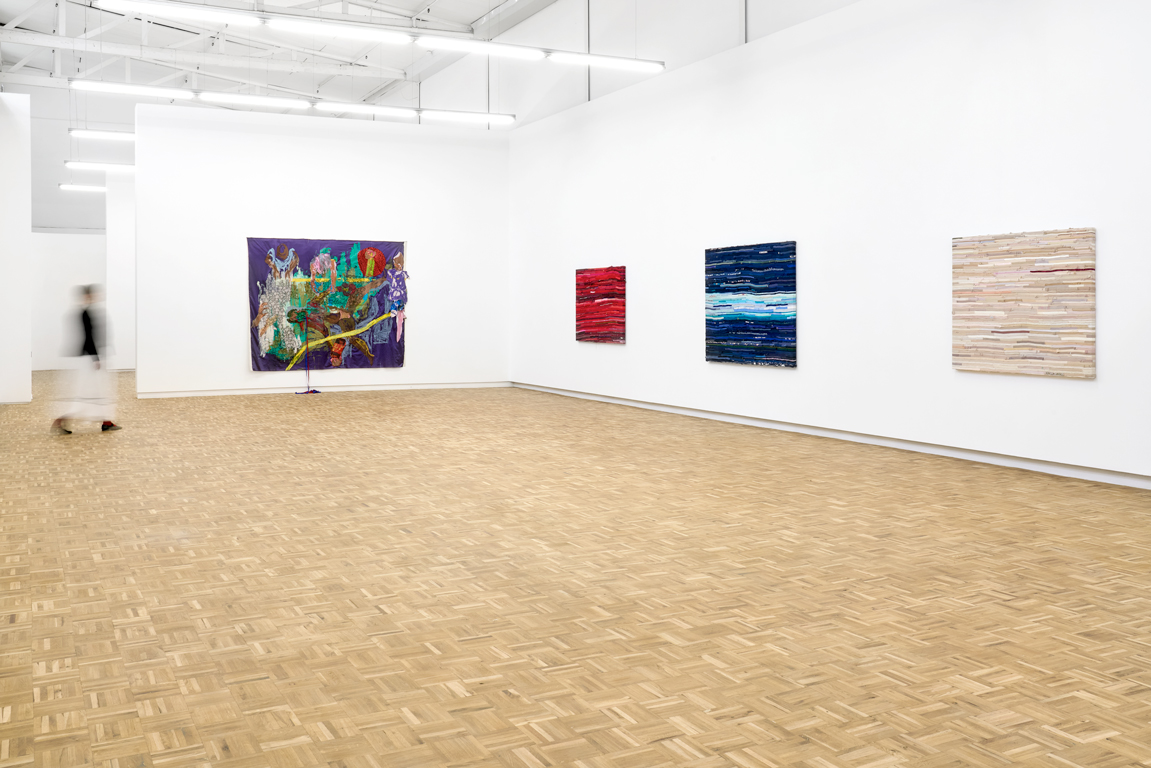
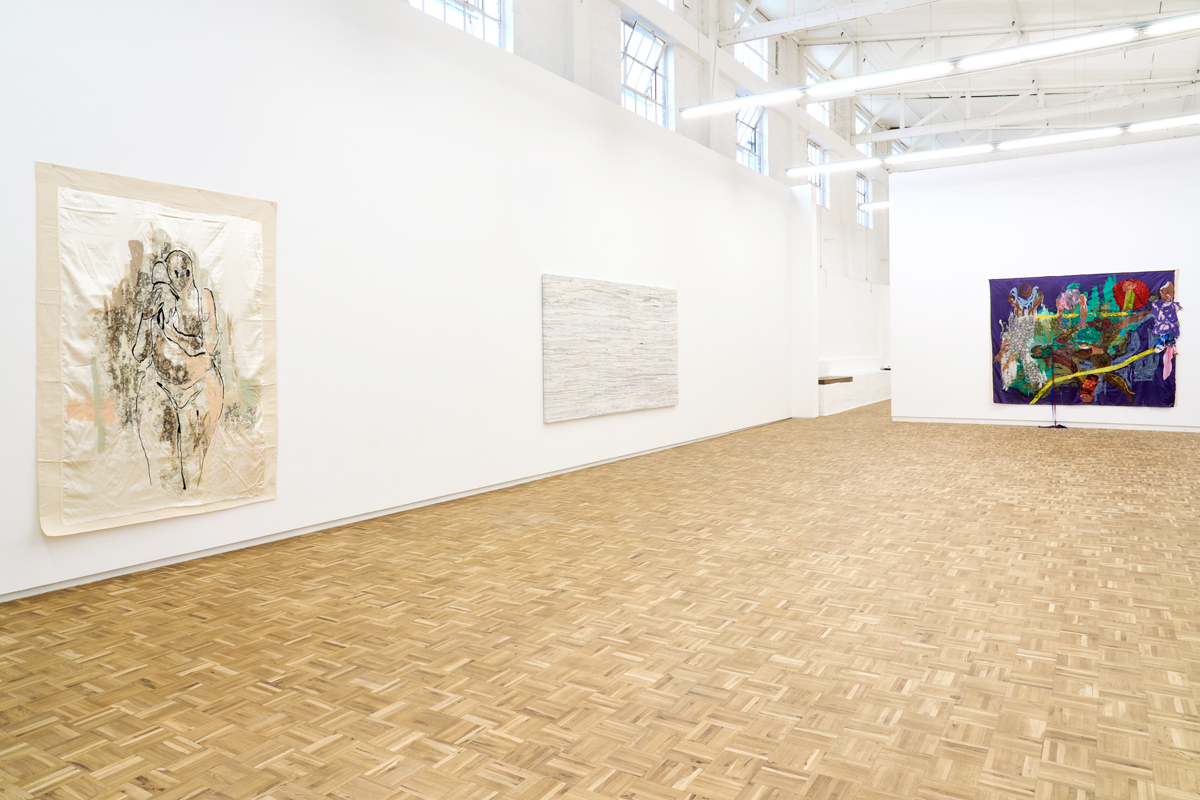
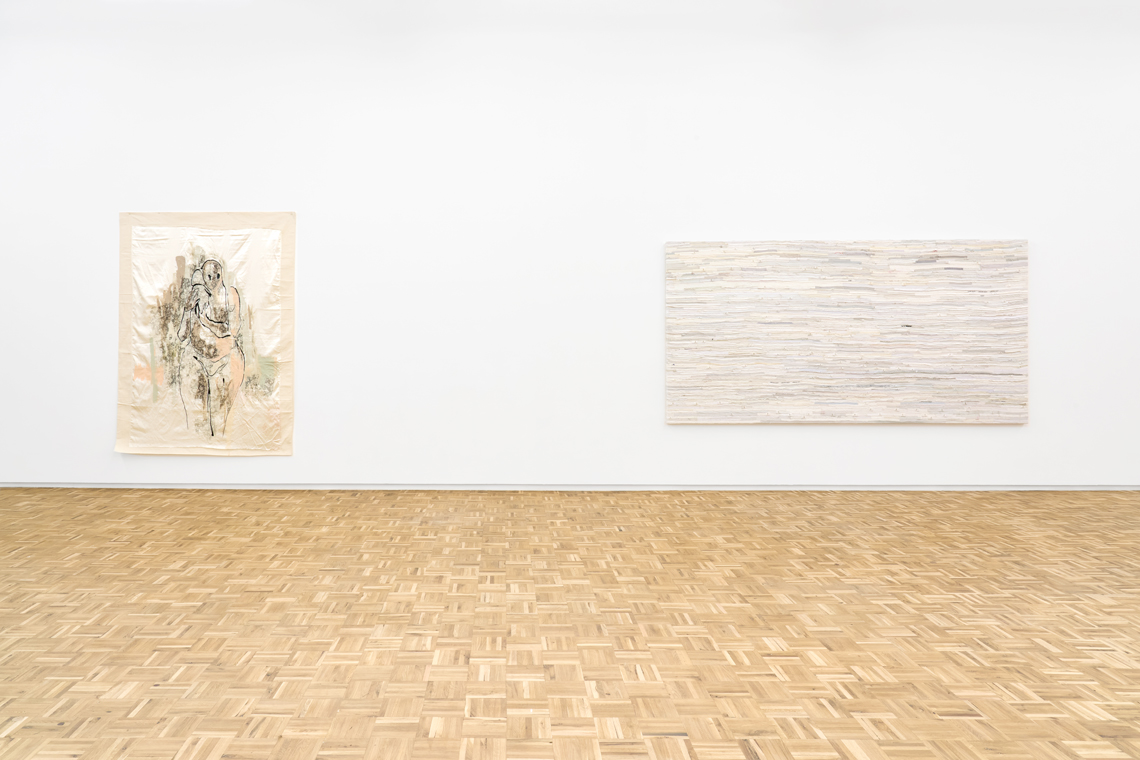
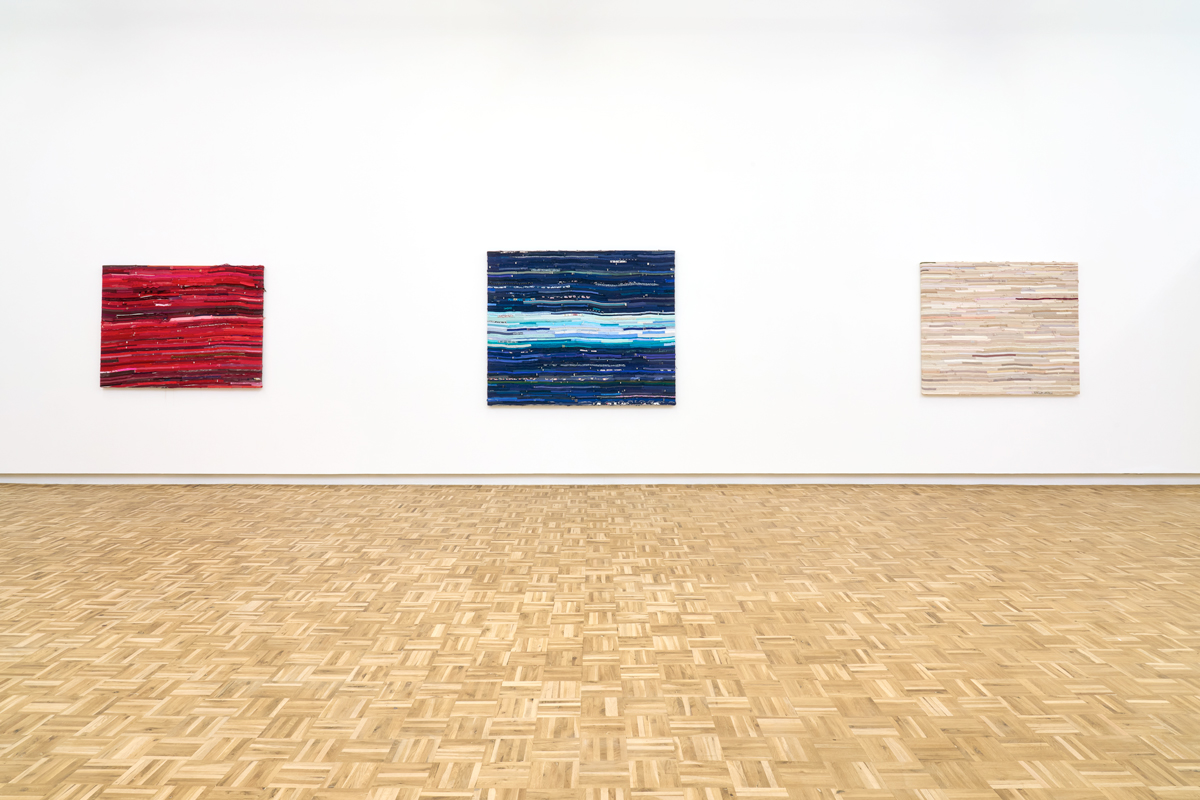
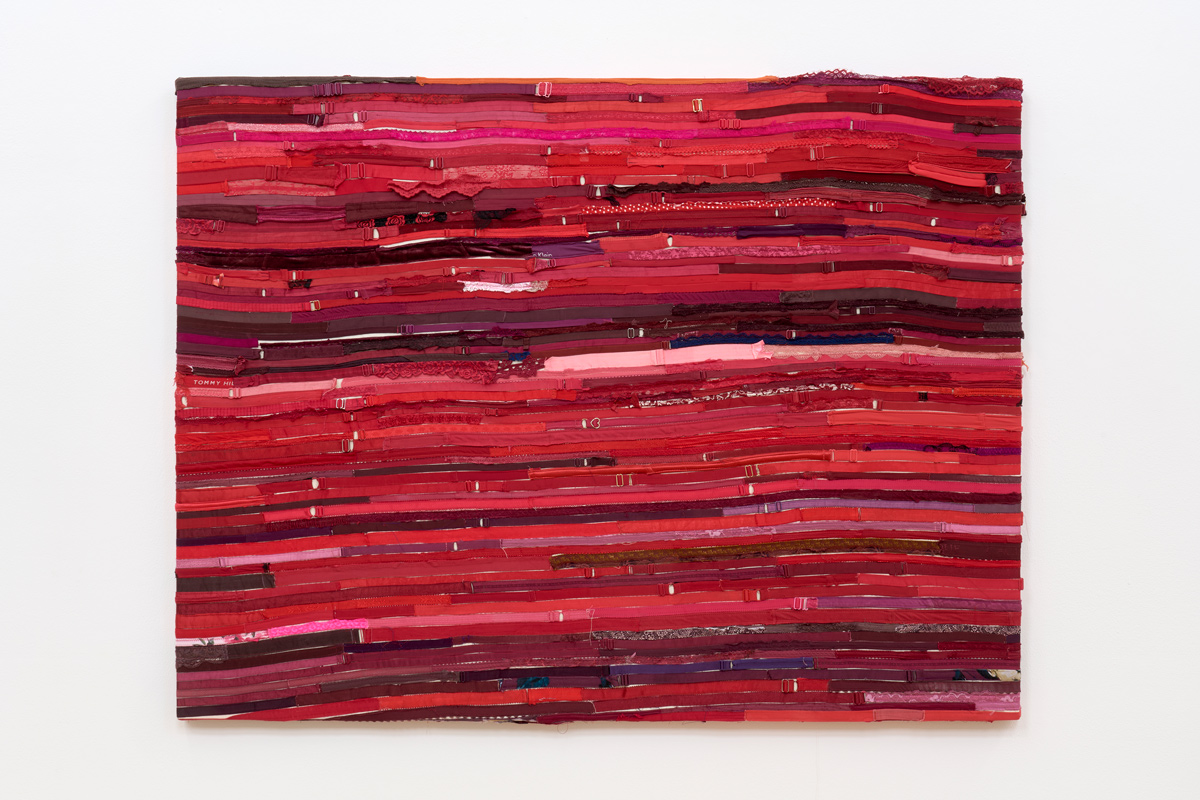



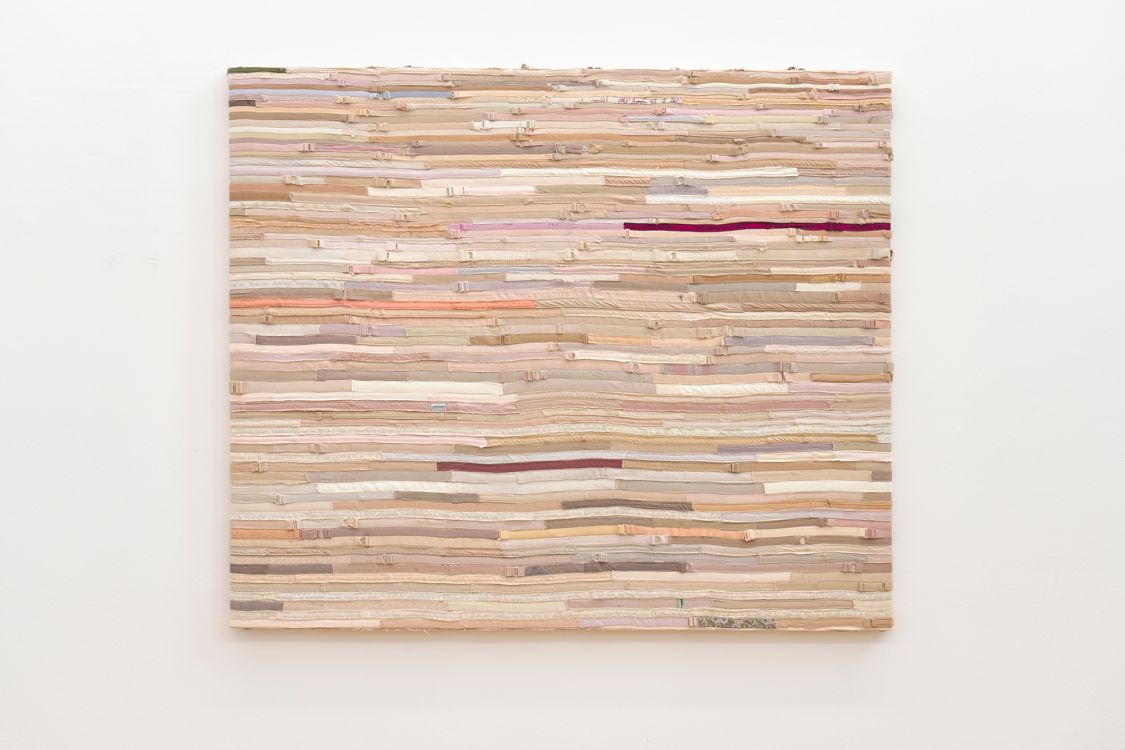






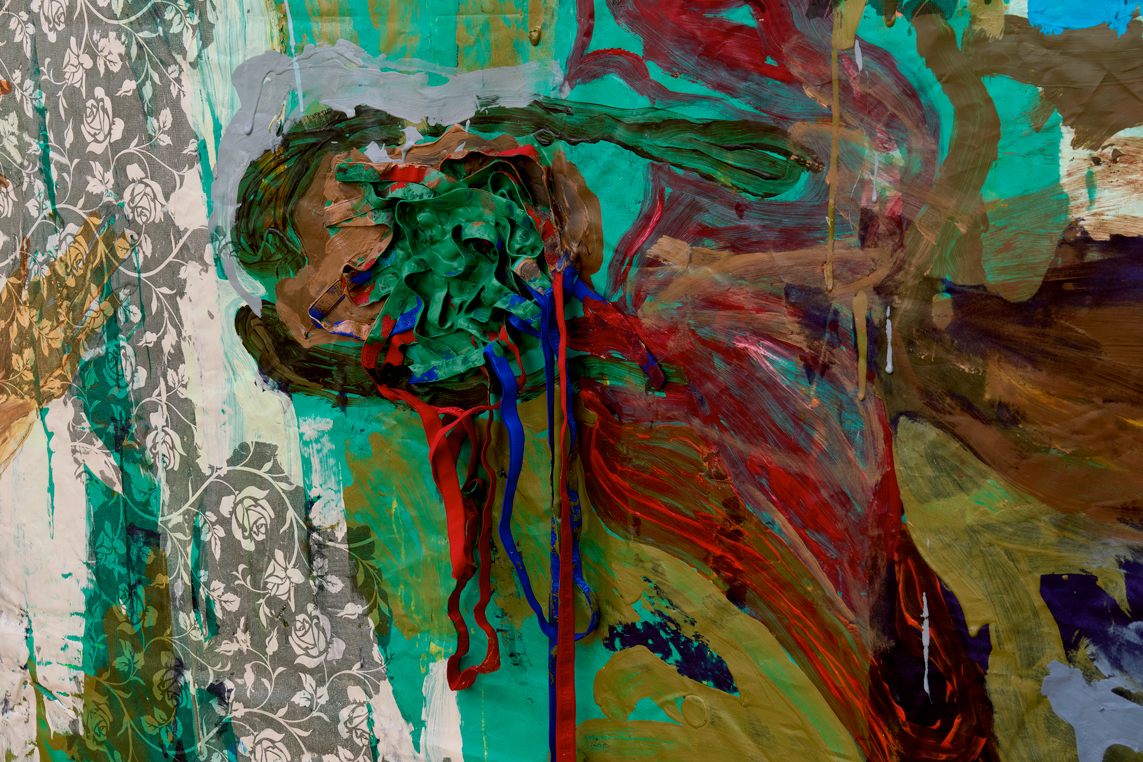
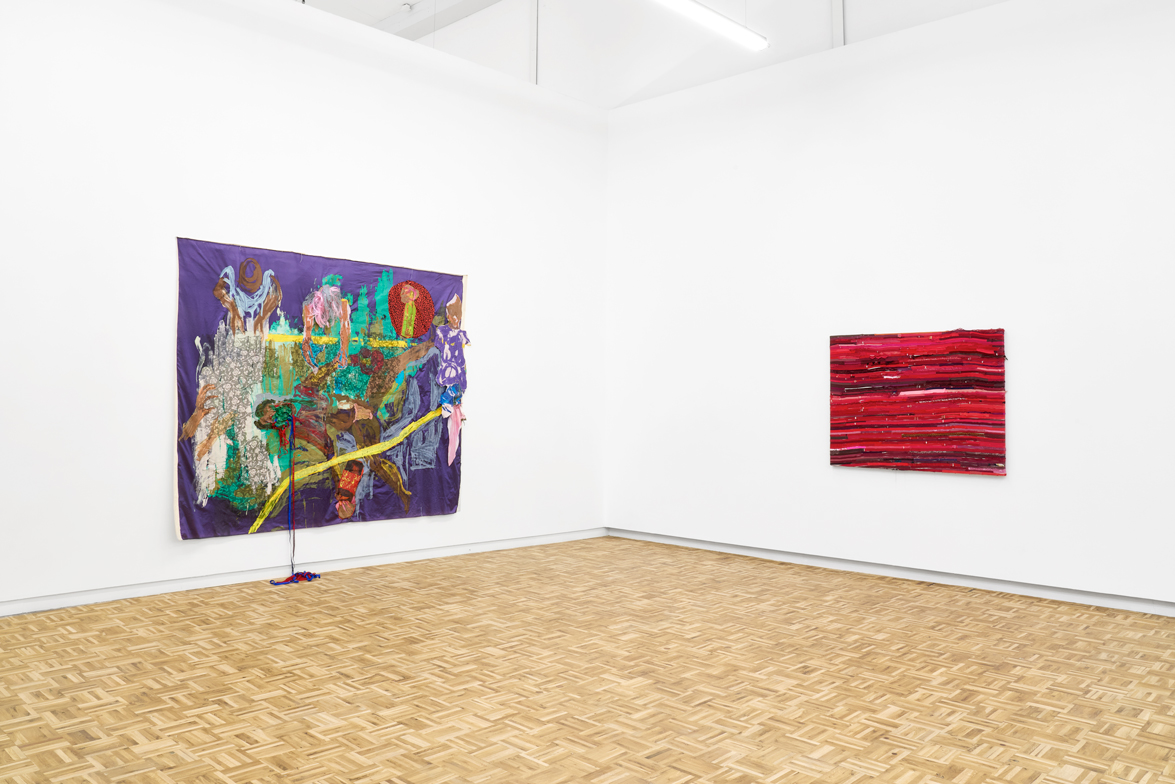
blank is pleased to present Body Count, Kresiah Mukwazhi’s second solo exhibition with the gallery.
Comprising of a new series of textile collages and paintings, Body Count continues the artist’s inquiry into the female body as a political instrument and a contested site upon which the power dynamics of patriarchal society are played out. The exhibition takes its title from the double meaning of the phrase which refers not only to the number of people killed in a singular event but also, in more colloquial terms, the number of sexual partners a person has had. Metaphorically linking these concepts of death and sex, the title points to the contrast in attitudes towards male and female sexual expression and how this dangerous double standard reinforces systemic gender-based discrimination and violence. Mukwazhi draws a parallel between these gendered perceptions of promiscuity and the stigmatisation of female sexuality, identified through both the policing and exploitation of women’s bodies.
Enmeshed in the discourses of patriarchal cultures, traditions, and belief systems, this control over women’s bodies extends to the prescription of accepted codes of behaviour and dress. Connoting sex and femininity, the display of women’s underwear is significant in Zimbabwean society: considered controversial or even taboo if worn revealingly, its wearer judged according to notions of purity and eligibility. (Demonstrating its potency as a symbol, the witchcraft practice known as mubobobo involves the use of woman’s underwear to perform something like telekinetic rape.)
The artist confronts this misogynistic trope by working directly with these culturally loaded objects. Using hundreds of secondhand bras - smuggled into the country in bulk - she carefully deconstructs each piece of underwear, then stitches together and stretches the straps over frames. The resulting compositions recall the many women whose bodies have worn them; they are permeated with the traces of their previous owners, both in the physical and the ‘energetic’ sense. For Mukwazhi, the works gesture too at the countless women who have lost their lives due to violence.
The exhibition also includes two mixed media paintings on found fabrics. The unrest of Movado remembers the violent murder of the sex worker Movado; its brutal image rendered in bright colours on a backdrop of regal purple. Movado’s tragic death is symbolic of the life-threatening conditions of sex work and the vulnerability of the women who are forced to make a living from it. In stark contrast to this work is an intimate self-portrait of the artist with her newborn son. A simple line drawing set against a backdrop of cream-coloured satin with the embedded traces of a floral pattern, the work is a meditation on the artist’s own maternal journey and a celebration of the softness of motherhood and femininity. Mukwazhi’s ‘ode to herself’ becomes a necessary healing counterpoint to the rest of the exhibition.
Born in Harare in 1992, Mukwazhi has exhibited internationally at various institutions including Nottingham Contemporary; The Vienna Secession; Philara Foundation, Dusseldorf; Kunsthalle Emden; the Zimbabwean Pavilion, La Biennale di Venezia; Kunstmuseum Wolfsburg; Norval Foundation, Cape Town; Iziko South African National Gallery, Cape Town; the Zeitz Museum of Contemporary Art Africa (MOCAA), Cape Town; the Netherlands Institute of Sound and Vision, Hilversum; SAVVY Contemporary at Njelele Art Station, Harare; and the National Gallery of Zimbabwe, Bulawayo. Mukwazhi lives and works in Harare, Zimbabwe
Artist news
Kresiah Mukwazhi will realise a large-scale installation for Art Basel Unlimited from 10 to 16 June. This monumental work will be presented jointly by blank projects and Jan Kaps in Cologne.
Comprising of a new series of textile collages and paintings, Body Count continues the artist’s inquiry into the female body as a political instrument and a contested site upon which the power dynamics of patriarchal society are played out. The exhibition takes its title from the double meaning of the phrase which refers not only to the number of people killed in a singular event but also, in more colloquial terms, the number of sexual partners a person has had. Metaphorically linking these concepts of death and sex, the title points to the contrast in attitudes towards male and female sexual expression and how this dangerous double standard reinforces systemic gender-based discrimination and violence. Mukwazhi draws a parallel between these gendered perceptions of promiscuity and the stigmatisation of female sexuality, identified through both the policing and exploitation of women’s bodies.
Enmeshed in the discourses of patriarchal cultures, traditions, and belief systems, this control over women’s bodies extends to the prescription of accepted codes of behaviour and dress. Connoting sex and femininity, the display of women’s underwear is significant in Zimbabwean society: considered controversial or even taboo if worn revealingly, its wearer judged according to notions of purity and eligibility. (Demonstrating its potency as a symbol, the witchcraft practice known as mubobobo involves the use of woman’s underwear to perform something like telekinetic rape.)
The artist confronts this misogynistic trope by working directly with these culturally loaded objects. Using hundreds of secondhand bras - smuggled into the country in bulk - she carefully deconstructs each piece of underwear, then stitches together and stretches the straps over frames. The resulting compositions recall the many women whose bodies have worn them; they are permeated with the traces of their previous owners, both in the physical and the ‘energetic’ sense. For Mukwazhi, the works gesture too at the countless women who have lost their lives due to violence.
The exhibition also includes two mixed media paintings on found fabrics. The unrest of Movado remembers the violent murder of the sex worker Movado; its brutal image rendered in bright colours on a backdrop of regal purple. Movado’s tragic death is symbolic of the life-threatening conditions of sex work and the vulnerability of the women who are forced to make a living from it. In stark contrast to this work is an intimate self-portrait of the artist with her newborn son. A simple line drawing set against a backdrop of cream-coloured satin with the embedded traces of a floral pattern, the work is a meditation on the artist’s own maternal journey and a celebration of the softness of motherhood and femininity. Mukwazhi’s ‘ode to herself’ becomes a necessary healing counterpoint to the rest of the exhibition.
Born in Harare in 1992, Mukwazhi has exhibited internationally at various institutions including Nottingham Contemporary; The Vienna Secession; Philara Foundation, Dusseldorf; Kunsthalle Emden; the Zimbabwean Pavilion, La Biennale di Venezia; Kunstmuseum Wolfsburg; Norval Foundation, Cape Town; Iziko South African National Gallery, Cape Town; the Zeitz Museum of Contemporary Art Africa (MOCAA), Cape Town; the Netherlands Institute of Sound and Vision, Hilversum; SAVVY Contemporary at Njelele Art Station, Harare; and the National Gallery of Zimbabwe, Bulawayo. Mukwazhi lives and works in Harare, Zimbabwe
Artist news
Kresiah Mukwazhi will realise a large-scale installation for Art Basel Unlimited from 10 to 16 June. This monumental work will be presented jointly by blank projects and Jan Kaps in Cologne.